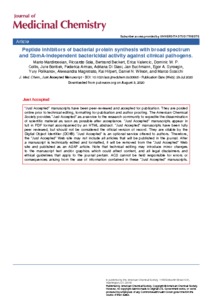Mardirossian, M;
Sola, R;
Beckert, B;
Valencic, E;
Collis, DWP;
Borišek, J;
Armas, F;
Di Stasi, A;
Buchmann, J;
Syroegin, EA;
et al.
Mardirossian, M; Sola, R; Beckert, B; Valencic, E; Collis, DWP; Borišek, J; Armas, F; Di Stasi, A; Buchmann, J; Syroegin, EA; Polikanov, Y; Magistrato, A; Hilpert, K; Wilson, DN; Scocchi, M
(2020)
Peptide inhibitors of bacterial protein synthesis with broad spectrum and SbmA-independent bactericidal activity against clinical pathogens.
Journal of Medicinal Chemistry, 63 (17).
pp. 9560-9602.
ISSN 0022-2623
https://doi.org/10.1021/acs.jmedchem.0c00665
SGUL Authors: Hilpert, Kai
![[img]](https://openaccess.sgul.ac.uk/112234/1.hassmallThumbnailVersion/2020%20-%20Mardirossian%20-%20J%20Med%20Chem%20-%20Bac7%20la%20scan%20and%20derivatives.pdf)  Preview |
|
PDF
Accepted Version
Available under License ["licenses_description_publisher" not defined].
Download (799kB)
| Preview
|
Abstract
Proline-rich antimicrobial peptides (PrAMPs) are promising lead compounds for developing new antimicrobials, however their narrow spectrum of action is limiting. PrAMPs kill bacteria binding to their ribosomes and inhibiting protein synthesis. In this study, 133 derivatives of the PrAMP Bac7(1-16) were synthesized to identify the crucial residues for ribosome inactivation and antimicrobial activity. Then, five new Bac7(1-16) derivatives were conceived and characterized by antibacterial and membrane permeabilization assays, by X-ray crystallography and molecular dynamics simulations. Some derivatives displayed broad spectrum activity, encompassing Escherichia coli, Klebsiella pneumoniae, Acinetobacter baumanii, Pseudomonas aeruginosa and Staphylococcus aureus. Two peptides out of five, acquired a weak membrane-perturbing activity, while maintaining the ability to inhibit protein synthesis. These derivatives became independent of the SbmA transporter, commonly used by native PrAMPs, suggesting that they obtained a novel route to enter bacterial cells. PrAMP-derived compounds could become new-generation antimicrobials to combat the antibiotic-resistant pathogens.
Statistics
Item downloaded times since 13 Aug 2020.
Actions (login required)
 |
Edit Item |


